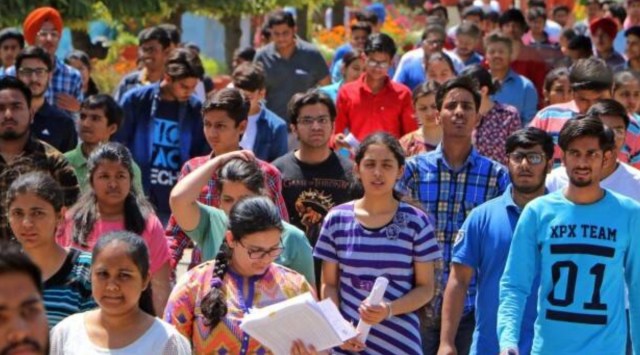IIT-JEE Advanced 2023: After 2022 low, qualifying percentiles rises across categories
According to the merit list released by the National Testing Agency (NTA), 43 candidates, including one female student, have scored 100 percentile.
 These include 11 from Telangana, five each from Andhra Pradesh and Rajasthan; four from Uttar Pradesh, three each from Gujarat and Karnataka, two each from Delhi and Maharashtra; and one each from Haryana, Chandigarh, West Bengal, Kerala, Tamil Nadu, Bihar, Chhattisgarh and Madhya Pradesh.
File
These include 11 from Telangana, five each from Andhra Pradesh and Rajasthan; four from Uttar Pradesh, three each from Gujarat and Karnataka, two each from Delhi and Maharashtra; and one each from Haryana, Chandigarh, West Bengal, Kerala, Tamil Nadu, Bihar, Chhattisgarh and Madhya Pradesh.
File A YEAR after hitting a four-year low, the qualifying percentiles to take the Joint Entrance Examination (Advanced), which is the entrance test for undergraduate courses in the Indian Institutes of Technology (IITs), have increased. The results of the JEE (Main) 2023, declared on Saturday, captured the rise.
According to the merit list released by the National Testing Agency (NTA), 43 candidates, including one female student, have scored 100 percentile.
These include 11 from Telangana, five each from Andhra Pradesh and Rajasthan; four from Uttar Pradesh, three each from Gujarat and Karnataka, two each from Delhi and Maharashtra; and one each from Haryana, Chandigarh, West Bengal, Kerala, Tamil Nadu, Bihar, Chhattisgarh and Madhya Pradesh.
A percentile score is a comparative result that indicates the proportion of candidates who have scored marks that is equal to or less than the given score. For example, a student with a 70 percentile score in an exam would mean that she got more marks than 70 per cent of the candidates who appeared for it.

The JEE (Main), apart from being a gateway to BE/ BTech at the National Institutes of Technology (NITs) and other centrally funded technical institutions, is also an eligibility test for the JEE (Advanced). Only those who have the qualifying cut-offs can appear for JEE (Advanced) for admission to the IITs.
This time, 2,50,255 candidates have qualified for the JEE (Advanced) scheduled to be held on June 4. Of these, 39.4 per cent are from the general category, 14.99 per cent from the SC category, 7.49 per cent from the ST category, and 27.01 per cent from the OBC category.
For general category candidates, the cut-off or qualifying percentile for JEE (Advanced)-2023 is 90.77, up from 88.4 in 2022, and 87.9 in 2021. The corresponding cut-off was 90.3 and 89.7 in 2020 and 2019, respectively.
For Scheduled Caste candidates, the qualifying percentile is 51.97 this time. It was 43.08 in 2022, 46.8 in 2021, 50.1 in 2020, and 54.01 in 2019.
The qualifying percentile for Scheduled Tribe students is 37.23 this time. It was 26.7 in 2022, 34.6 in 2021, 39.06 in 2020 and 44.3 in 2019.
The qualifying percentile for OBC (non-creamy layer) students has also increased to 73.61. It was 67 in 2022, 68.02 in 2021, 72.8 in 2020.
For the EWS category candidates, the qualifying percentile this time is 75.62, up from 63.11 last year.
Apart from a slide in the qualifying scores for JEE (Advanced) and the number of candidates securing 100 percentile, 2022 also saw a four-year low in the number of registrations at 10.26 lakh. This year, the total number of registrations jumped to 11.62 lakh, of which 11.13 lakh candidates appeared in both sessions of the exam held on 13 dates between January 24 and April 15. In case of candidates who appeared in both sessions, the better score will be used for admissions.
The social categorisation of the toppers showed that 32 were from the general category, one SC, three EWS, seven OBC. The top percentile in the ST bracket was 99.99.
The NTA had restored the Class 12 performance criterion of 75 per cent for qualifying for the JEE (Main) 2023. The requirement was waived in the earlier three editions of the entrance test held after the onset of the Covid-19 pandemic in 2020.
- 01
- 02
- 03
- 04
- 05
































